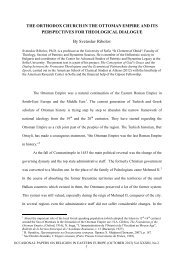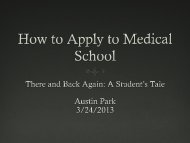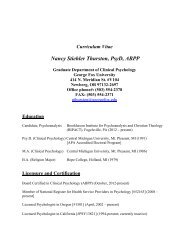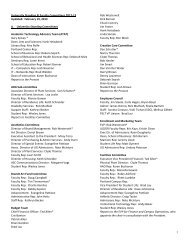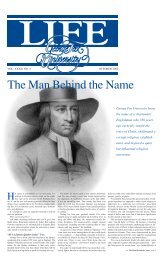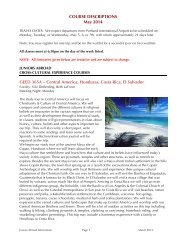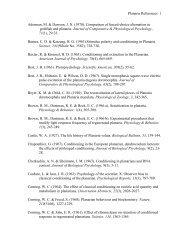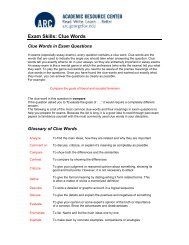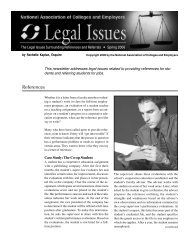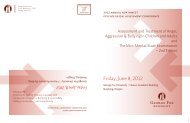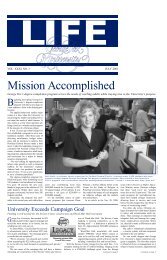LIFE Vol 32, No 3 - George Fox University
LIFE Vol 32, No 3 - George Fox University
LIFE Vol 32, No 3 - George Fox University
Create successful ePaper yourself
Turn your PDF publications into a flip-book with our unique Google optimized e-Paper software.
<strong>Vol</strong> <strong>32</strong> <strong>No</strong> 3 7/1/02 9:45 AM Page 1<br />
<strong>LIFE</strong><br />
VOL. XXXII, NO. 3 JULY 2002<br />
Gina’s Gift<br />
“You know at once when<br />
you read a fiction writer<br />
who has the Big Gift . . .<br />
Gina Ochsner unmistakably<br />
has the Big Gift.”<br />
— Robert Olen Butler, Pulitzer Prize<br />
winner for fiction<br />
KELLY JAMES<br />
Remember the name: Gina<br />
Ochsner. She’s the most critically<br />
acclaimed fiction author ever<br />
to come out of <strong>George</strong> <strong>Fox</strong> — and she’s<br />
only <strong>32</strong>.<br />
In the last four years, her short stories<br />
have won nearly two dozen national and<br />
international literary awards.<br />
“The list is stunning,” says <strong>George</strong><br />
<strong>Fox</strong> Professor of English Ed Higgins.<br />
“This kind of thing is nearly impossible.”<br />
One of her biggest awards was the<br />
Flannery O’Connor Award that the 1992<br />
graduate received for her first book of<br />
short stories, The Necessary Grace to<br />
Fall, published this year by The <strong>University</strong><br />
of Georgia Press. A glowing April<br />
review of the book in The Oregonian<br />
newspaper describes her as “perched to<br />
become Oregon lit’s new It Girl.”<br />
What makes Ochsner’s accomplishments<br />
even more remarkable is the fact<br />
she alternates between dialogue and dia-<br />
pers as a stay-at-home mother. While<br />
raising three children severely limits her<br />
writing time, it also provided her inspiration.<br />
A near-death experience during the<br />
birth of her first child transformed her<br />
from a frustrated graduate student to a<br />
rising young star in the literature world.<br />
Undergraduate Drivel<br />
Ochsner’s <strong>George</strong> <strong>Fox</strong> classmates<br />
might remember her as Gina Withnell, a<br />
quiet, freckled, academically minded<br />
language arts teaching major who participated<br />
in drama and choir.<br />
Ochsner recalls her <strong>George</strong> <strong>Fox</strong> experience<br />
with fondness and her undergraduate<br />
writing with horror. She expresses<br />
gratitude none of the “drivel” from that<br />
era remains in her mentors’ possession.<br />
Her professors tell a different story of<br />
a talented writer who was unique for pursuing<br />
independent study of the daunting<br />
works of Irish author James Joyce. Professor<br />
of English Becky Ankeny remembers<br />
Ochsner dazzling an audience at the<br />
National Undergraduate Literature Conference<br />
with one of her short stories.<br />
Afterward, many approached to ask<br />
where Ochsner got her ideas.<br />
The ideas continued to come. During<br />
her senior year student teaching at St.<br />
Paul High School, Ochsner decided she<br />
wasn’t called to the classroom. She wanted<br />
to write.<br />
Learning by Failing<br />
“<strong>No</strong> one can teach you how to write,”<br />
says Ochsner. Still, she pursued further<br />
academic study after <strong>George</strong> <strong>Fox</strong><br />
because she says she needed to have<br />
someone continue to critique her work.<br />
“I learn what’s most helpful by failing.”<br />
She says her lifelong struggle with<br />
dyslexia resurfaced during her road trip<br />
to graduate school. She was headed to<br />
the <strong>University</strong> of Iowa in Iowa City until<br />
her traveling companion reviewed her<br />
acceptance letter while they sped through<br />
Nebraska. Ochsner’s friend discovered<br />
she had been accepted not at the <strong>University</strong><br />
of Iowa, but at Iowa State <strong>University</strong><br />
in Ames. They changed their trajectory.<br />
After earning a master’s in English at<br />
Iowa State, she returned to the <strong>No</strong>rthwest<br />
to pursue a master of fine arts degree in<br />
creative writing at the <strong>University</strong> of Oregon.<br />
She says her father, Dick Withnell,<br />
wasn’t so sure of her chosen career track.<br />
Her grad-school professors didn’t help<br />
out by cautioning the <strong>George</strong> <strong>Fox</strong> board<br />
member his daughter might not be suited<br />
for academia.<br />
“I don’t write stories that workshop<br />
well,” she says, describing the sessions<br />
where writers meet to critique one another’s<br />
work. Sometimes the feedback is<br />
see Gina’s Gift, page 5
<strong>Vol</strong> <strong>32</strong> <strong>No</strong> 3 7/1/02 9:45 AM Page 2<br />
2<br />
Change of Heart<br />
One of the 21 new members of the<br />
Henry Mills Society was so rebellious<br />
as a student she says religion professor Ron<br />
Stansell “would probably pass out” if he<br />
knew she is leaving her entire estate —<br />
currently worth $400,000 — to <strong>George</strong> <strong>Fox</strong>.<br />
The 1960s <strong>George</strong> <strong>Fox</strong> graduate requested<br />
anonymity for her gift. Her contribution will<br />
fund an endowed scholarship for Seminary<br />
students majoring in pastoral ministries. Her<br />
desire to give back to her alma mater came<br />
as she matured and realized <strong>George</strong> <strong>Fox</strong> was<br />
the place that shaped her.<br />
The society is named after the man who<br />
established the endowment with a gift of<br />
$1,200. In 1902,<br />
Henry Mills deeded<br />
his home to what<br />
was then Pacific College<br />
with the stipulation<br />
that when he<br />
died the college<br />
sell it and use the<br />
proceeds for an<br />
endowment. Today there are more than 400<br />
Henry Mills Society members who represent<br />
more than $19 million in future gifts to<br />
<strong>George</strong> <strong>Fox</strong>.<br />
For more information about the Henry Mills<br />
Society or if you have already included<br />
<strong>George</strong> <strong>Fox</strong> <strong>University</strong> in your estate plans,<br />
please contact Todd Newell, director of estate<br />
and planned giving, at 503-554-2117.<br />
<strong>LIFE</strong> STAFF<br />
Editor<br />
Anita Cirulis<br />
Contributing Writers<br />
Blair Cash<br />
Anita Cirulis<br />
Rob Felton<br />
Janet Goetze<br />
Barry Hubbell<br />
Photographers<br />
Anita Cirulis<br />
Kelly James<br />
Frank Miller<br />
Designer<br />
Colin Miller<br />
<strong>George</strong> <strong>Fox</strong> <strong>University</strong> <strong>LIFE</strong> (USPS 859-<br />
820) is published four times a year by<br />
<strong>George</strong> <strong>Fox</strong> <strong>University</strong>, 414 N. Meridian<br />
Street, Newberg, OR, 971<strong>32</strong>-2697, USA.<br />
Periodicals postage paid at Newberg,<br />
Oregon. Postmaster: Send address<br />
changes to <strong>LIFE</strong>,<strong>George</strong> <strong>Fox</strong> <strong>University</strong>,<br />
414 N. Meridian St. #6069, Newberg, OR<br />
971<strong>32</strong>-2697.<br />
Please send letters, alumni news, and<br />
address changes to <strong>LIFE</strong>, <strong>George</strong> <strong>Fox</strong><br />
<strong>University</strong>, 414 N. Meridian St. #6069,<br />
Newberg, OR 971<strong>32</strong>-2697.<br />
Phone: 503-554-2126. Use our<br />
Web site: www.georgefox.edu/alumni,<br />
and click “Send Us Your News.”<br />
E-mail: alumni@georgefox.edu.<br />
GEORGE FOX UNIVERSITY<br />
ADMINISTRATION<br />
President<br />
H. David Brandt<br />
Provost<br />
Robin E. Baker<br />
Vice President for Marketing and<br />
Advancement<br />
Dana L. Miller<br />
Vice President for Financial Affairs<br />
G. Michael Goins<br />
Vice President for Student Life<br />
Bradley A. Lau<br />
Executive Assistant to the President<br />
Barry A. Hubbell<br />
Ankenys Named <strong>Vol</strong>unteers of the Year<br />
Peanut brittle may<br />
seem like a rather<br />
strange legacy for which<br />
to be noted. But then you<br />
may not have had any of<br />
Harold Ankeny’s annual<br />
homemade treat.<br />
That yearly contribution<br />
to the holiday season<br />
at <strong>George</strong> <strong>Fox</strong> <strong>University</strong><br />
helped Ankeny — and his<br />
wife, Betty — in being<br />
named the <strong>University</strong>’s<br />
2002 <strong>Vol</strong>unteers of the<br />
Year.<br />
The Ankenys were<br />
cited for their involvement<br />
at the 16th annual<br />
<strong>Vol</strong>unteer Thank You<br />
Luncheon June 18 on the<br />
Newberg campus.<br />
“The delicious peanut<br />
brittle Harold makes for<br />
the (<strong>George</strong> <strong>Fox</strong>) Auxiliary<br />
Holiday Bazaar” was<br />
on the list of contributions made by the<br />
Newberg couple. The proceeds from its<br />
sale go to auxiliary projects on the campus.<br />
Betty is one of the workers for the<br />
annual fund-raising event.<br />
Both help with the planting of the <strong>University</strong>’s<br />
summer hanging flower baskets.<br />
The list of contributions also includes<br />
Harold’s recruitment of volunteers for<br />
<strong>Vol</strong>unteers on Wheels (VOW), a group<br />
that travels the West helping churches<br />
and nonprofit groups with construction<br />
projects. At <strong>George</strong> <strong>Fox</strong>, VOW has<br />
helped with concrete work, sidewalk<br />
construction, and painting.<br />
Harold coordinated the alumni portion<br />
of <strong>George</strong> <strong>Fox</strong>’s $16 million Cen-<br />
Help Wanted<br />
The peanut brittle Harold Ankeny makes for sale each Christmas<br />
by the <strong>George</strong> <strong>Fox</strong> Auxiliary is just one of the reasons he<br />
and his wife, Betty, were named the <strong>University</strong>’s <strong>Vol</strong>unteers of<br />
the Year for 2002.<br />
Since I am committed to personally interviewing each<br />
candidate for a full-time faculty position at <strong>George</strong> <strong>Fox</strong><br />
<strong>University</strong>, a significant amount of time each spring semester<br />
is given to that activity. At the end of the season, I find<br />
it helpful to think about the recruitment process as well as<br />
the profile of the new class. Who are the people joining us<br />
in August, and did the process work?<br />
The procedure we follow in a nationwide search for faculty<br />
members is long and, sometimes, cumbersome. Position<br />
openings usually are posted sometime between<br />
<strong>No</strong>vember and January. Campus interviews begin as early<br />
as February and continue through May, with a few occurring<br />
as late as June.<br />
The process is centralized in the provost’s office, with<br />
the undergraduate and graduate deans coordinating each<br />
search. The academic department is the first, and primary,<br />
screen for applications that are received, but no person is<br />
hired without interviews with the appropriate dean, the<br />
provost, and me. Outstanding secretarial support in the<br />
academic affairs office coordinates this lengthy, complicated<br />
process.<br />
One reason I take time to reflect on this process is that<br />
it is also expensive, both in dollars and in time and effort<br />
of many people. Much of the work needs to be done away<br />
from standard business hours.<br />
So, is it worth it? The answer is complicated. In an institution<br />
the size of <strong>George</strong> <strong>Fox</strong> <strong>University</strong>, we hire approximately<br />
a dozen new faculty members each year. When I<br />
consider this question, I see mental images of the people<br />
we hire and know the answer.<br />
If I shared with you summary statements for each person<br />
hired, you would have a more detailed picture of the results<br />
of the process. But what can I tell you in a few lines? I will<br />
tennial Campaign, and he was Prayer<br />
Committee chair for the <strong>University</strong>’s<br />
recently completed $22 million Legacy<br />
Campaign.<br />
In the community, Harold is a member<br />
(and past president) of Kiwanis. He was<br />
charter president of the Newberg Optimist<br />
Club, and served as lieutenant governor<br />
of the club’s Pacific <strong>No</strong>rthwest district.<br />
He also was a charter board member<br />
and board president for the Herbert<br />
Hoover Boys and Girls Club of Newberg,<br />
and board president for C.S. Lewis Community<br />
School.<br />
Betty has served as a church trustee,<br />
served on the Christian Women’s Club<br />
Council, and was involved in PTA when<br />
share a couple generalizations and observations from outside<br />
the process.<br />
Recently, a team of three scientists from three institutions<br />
outside the Pacific <strong>No</strong>rthwest visited <strong>George</strong> <strong>Fox</strong><br />
<strong>University</strong>. They commented generously about the high<br />
quality of new, young faculty<br />
members we have in our science<br />
and engineering areas.<br />
Likewise, each fall semester<br />
Tom Johnson, professor of biblical<br />
theology, teaches a Christian<br />
theology course to all our new<br />
faculty members. He sees these<br />
people in an academic setting and<br />
reports high interest and ability in<br />
President<br />
David Brandt<br />
their children were in<br />
school. She was a local<br />
floral shop designer, with<br />
many donations of her<br />
arrangements over the<br />
years for various fundraising<br />
events.<br />
The couple met while<br />
attending Pacific College<br />
(now <strong>George</strong> <strong>Fox</strong>) and<br />
were married in 1948. He<br />
is a 1950 graduate, and<br />
she was a member of the<br />
class of 1951. Harold,<br />
then known as “Spud,”<br />
was a three-sport athlete.<br />
In 2001 he was inducted<br />
into <strong>George</strong> <strong>Fox</strong> <strong>University</strong>’s<br />
Sports Hall of Fame.<br />
Harold became a minister<br />
after graduation, and<br />
the couple’s first pastorate<br />
was at Agnew Friends<br />
Church near Port Angeles,<br />
Wash. After three years,<br />
the family moved to Timber, Ore., where<br />
he built and pastored the Timber Friends<br />
Church. They then moved to Idaho,<br />
where he taught at Greenleaf Friends<br />
Academy and Betty was an office secretary.<br />
Other pastoral positions followed<br />
over the next decade.<br />
In 1968 Harold began a 23-year career<br />
as a <strong>George</strong> <strong>Fox</strong> administrator, serving<br />
six years as dean of students, then<br />
becoming director of financial aid in<br />
1974. In 1981 he moved to <strong>George</strong> <strong>Fox</strong>’s<br />
development office as annual fund director,<br />
then as director of planned giving.<br />
He retired from <strong>George</strong> <strong>Fox</strong> in 1991, and<br />
in 1992 was named Alumnus of the Year<br />
by the <strong>University</strong>.<br />
these new faculty members.<br />
The most important evidence I<br />
see of a successful search process<br />
is that faculty members at <strong>George</strong><br />
<strong>Fox</strong> <strong>University</strong> come because they are called by God to<br />
serve here. A part of every interview I have with prospective<br />
faculty members is a discussion of their walk with the<br />
Lord. We hire people who are here because God wants<br />
them here. This results in faculty members who support<br />
and further our <strong>George</strong> <strong>Fox</strong> mission and who take seriously<br />
the call to high-quality education and the centrality of<br />
the integration of Christian faith with learning.<br />
The process works and is definitely worth it.<br />
ANITA CIRULIS
<strong>Vol</strong> <strong>32</strong> <strong>No</strong> 3 7/1/02 9:45 AM Page 3<br />
3<br />
Something Old, Something New<br />
The <strong>University</strong>’s engineering program will get a lift from a major remodel of Wood-Mar Hall<br />
The new and the old are merging as<br />
<strong>George</strong> <strong>Fox</strong> <strong>University</strong>’s expanding<br />
engineering major gets a new<br />
home in historic Wood-Mar Hall.<br />
The three-story Old Main, constructed<br />
in 1911, is being renovated on two floors<br />
to house a growing engineering program<br />
that will graduate its first seniors in 2004.<br />
The program is the only one at a<br />
Christian college in the western United<br />
States that offers both electrical and<br />
mechanical concentrations.<br />
Development of the engineering program<br />
is receiving significant financial<br />
support through a $500,000 grant from<br />
the W.M. Keck Foundation for equipment<br />
and a $400,000 grant from the M.J.<br />
Murdock Charitable Trust for building<br />
renovation.<br />
The building’s new use undoubtedly<br />
would please Herbert Hoover, the<br />
nation’s 31st president, who was an engineer<br />
by training and a student of Friends<br />
Pacific Academy, which became <strong>George</strong><br />
<strong>Fox</strong> <strong>University</strong>.<br />
Hoover visited the building, and for<br />
decades Wood-Mar Hall housed a large<br />
bronze plaque honoring the former student<br />
and president.<br />
Engineering program director Bob<br />
Harder likes to point out that Hoover<br />
considered engineering a most noble<br />
calling.<br />
“To the engineer falls the job of clothing the bare<br />
bones of science with life, comfort and hope,” Hoover<br />
once said.<br />
The renovation will recycle<br />
the once-doomed building<br />
back into teaching and<br />
laboratory space — something<br />
it housed for decades.<br />
In recent years, the first and<br />
second floors have contained<br />
administrative and service<br />
areas — and no classrooms.<br />
The building’s third floor<br />
was renovated in 1995 and<br />
houses the remodeled (but<br />
historically themed) Wood-<br />
Mar Auditorium.<br />
The estimated $1.2 million<br />
construction project to<br />
convert the more than<br />
11,000 square feet of space is expected to be completed<br />
in January 2003. Already, campus crews have gutted<br />
the interior of the bottom two levels, with the project<br />
now awaiting contractors to rebuild the interior for the<br />
new use.<br />
That new use will include first-floor labs for mechanics,<br />
mechanical engineering research, energetics, electronics,<br />
microprocessors, robotic controls, and computer-aided<br />
design, as well as a project engineering shop.<br />
Six faculty offices and an electrical engineering<br />
research lab are on the second floor, along with new<br />
space for the Office of the President and the Office of<br />
Academic Affairs.<br />
The Wood-Mar Hall location for expansion of the<br />
engineering program made sense: the 91-year-old building<br />
is literally buttressed by the adjacent Edwards-Holman<br />
Science Center, which currently houses the initial<br />
engineering program.<br />
In the current renovation, the original westside<br />
access to the landmark building will be reopened. Originally<br />
designed as the main and front entrance, the<br />
doors have been closed since the late 1950s, replaced by<br />
the north and south entrances as the only access points.<br />
The original entrance space was converted into<br />
administrative and service offices on both the first and<br />
second floors. That space is being recaptured for the<br />
entrance, and the side doors will be closed to allow for<br />
construction of additional laboratory and office space.<br />
<strong>George</strong> <strong>Fox</strong> <strong>University</strong>’s 3:2 engineering program<br />
was started in 1987. Under that plan, students attend<br />
Junior engineering majors Matthew Mickelson and Melissa Workman are members of the first class of students who<br />
will graduate with bachelor of science degrees in engineering in 2004. In January 2003, the first and second floors<br />
of gutted Wood-Mar Hall will house new engineering classrooms and labs, thanks to a $1.2 million portion of a<br />
recent capital campaign effort. The Office of the President will also be located on the second floor.<br />
“To prepare engineering<br />
students for a lifelong<br />
ministry of designing,<br />
manufacturing, and<br />
marketing products that<br />
serve and preserve<br />
God’s creation.”<br />
<strong>George</strong> <strong>Fox</strong> for three years, taking most of their general<br />
education, mathematics and science, and lower-division<br />
engineering courses.<br />
In doing so, they qualify<br />
to then transfer to any<br />
engineering school, where<br />
they spend two years in<br />
any one of several engineering<br />
curricula, including<br />
aerospace, chemical,<br />
civil, computer, electrical,<br />
or mechanical engineering,<br />
or engineering management.<br />
Students completing<br />
the five-year program<br />
receive two bachelor of<br />
science degrees: an<br />
applied science degree<br />
from <strong>George</strong> <strong>Fox</strong> after<br />
their four years, and an engineering degree from the<br />
engineering school after their fifth year. More than 100<br />
students have completed degrees in this way.<br />
<strong>No</strong>w, <strong>George</strong> <strong>Fox</strong> is offering a four-year bachelor of<br />
science degree in engineering (B.S.E.), with concentrations<br />
in either electrical or mechanical engineering.<br />
— Goal of the engineering program at<br />
<strong>George</strong> <strong>Fox</strong> <strong>University</strong><br />
Administration News<br />
Cook Takes Indiana Post<br />
Andrea Cook, vice president for enrollment services,<br />
has accepted the position of vice president for institutional<br />
advancement at Goshen College in Indiana. Her<br />
last day was July 3.<br />
Cook served at <strong>George</strong> <strong>Fox</strong> for 15 years in several<br />
positions in continuing education and enrollment services.<br />
During her tenure, enrollment almost quadrupled.<br />
About 100 employees gathered to say goodbye at her<br />
farewell reception in June.<br />
Vice Presidents Alter Titles and Duties<br />
<strong>George</strong> <strong>Fox</strong>’s top administration this summer has<br />
been reorganized to allow President Dave Brandt to<br />
spend more time on external affairs.<br />
Mike Goins, vice president for financial affairs, will<br />
continue to oversee all financial matters and is adding<br />
According to Harder, about 45 students are expected<br />
to be enrolled in the program this fall, which began<br />
accepting students in the fall of 2000.<br />
Students take a total of 129 credit hours to earn their<br />
degree, with core engineering courses offered the first<br />
two years, after which they concentrate on electrical or<br />
mechanical engineering as juniors and seniors.<br />
An eventual enrollment of 90 students in the engineering<br />
major is projected. While the majority of engineering<br />
students are choosing the four-year major, the<br />
3:2 applied science program will still be an option.<br />
The four-year phase-in of the major includes the hiring<br />
of three additional engineering faculty. Dr. Harder,<br />
the <strong>University</strong>’s professor of mechanical engineering, is<br />
the engineering program director and has been teaching<br />
at <strong>George</strong> <strong>Fox</strong> since 1988. In 1995, John Natzke, who<br />
earned a Ph.D. from the <strong>University</strong> of Michigan, was<br />
hired as associate professor of electrical engineering.<br />
This fall, Mike Magill, who has a Ph.D. from Oklahoma<br />
State <strong>University</strong>, will join the department as professor<br />
of mechanical engineering. Dr. Magill comes<br />
from Purdue <strong>University</strong>, where he has been a faculty<br />
member for the past seven years. Also this fall, a search<br />
will be conducted for two more engineering faculty, one<br />
of whom will be from the electrical engineering field.<br />
— Barry Hubbell<br />
Student Financial Services to his responsibilities.<br />
Robin Baker, formerly vice president for academic<br />
affairs, is now provost and will oversee all internal<br />
functions of the <strong>University</strong>. His responsibilities include<br />
student life as well as academic personnel and programs.<br />
Brad Lau continues as vice president for student<br />
life and will report to Baker.<br />
Dana Miller, formerly vice president for university<br />
advancement, will oversee all external affairs as vice<br />
president for marketing and advancement. In addition<br />
to his previous advancement responsibilities, he is<br />
responsible for admission and marketing functions.<br />
As part of the change, President Brandt this fall will<br />
begin meeting monthly with representatives of approximately<br />
10 university-wide committees such as technology,<br />
marketing, facilities, registration, and enrollment.<br />
Other committees will be formed later this year.<br />
FRANK MILLER
<strong>Vol</strong> <strong>32</strong> <strong>No</strong> 3 7/1/02 9:45 AM Page 4<br />
4<br />
Top Teachers<br />
Caitlin Corning and Steve Delamarter earn the 2002 Faculty Achievement Awards<br />
Alumni Invited to<br />
9-11 Serve Day<br />
<strong>George</strong> <strong>Fox</strong>’s fourth annual Serve Day<br />
will have special significance this year.<br />
Always scheduled on the second Wednesday<br />
after classes begin, the university-wide outreach<br />
this year falls on September 11.<br />
The Serve Day theme this year is<br />
“Remember, Reflect, Respond,” which will<br />
focus on service as one of many constructive<br />
responses to the tragic events of 9-11.<br />
Alumni wishing to participate can contact<br />
the Office of Student Life at 503-554-2310.<br />
Bill Jolliff Wins<br />
Research Award<br />
What matter, I or they?<br />
Mine or another's day,<br />
So the right word be said<br />
And life the sweeter made?<br />
— From My Triumph by John<br />
Greenleaf Whittier<br />
Concerned that college students weren’t<br />
being exposed to the work of John<br />
Greenleaf Whittier, an American poet and<br />
Quaker popular during the 19th century, Bill<br />
Jolliff produced a reader’s edition of Whittier’s<br />
poems.<br />
But it wasn’t just editing a book of poetry<br />
that garnered Jolliff, professor of writing/literature,<br />
the <strong>University</strong>’s Faculty Research Award<br />
for 2002. Jolliff himself is a prolific writer. He<br />
researches and writes about contemporary<br />
poet Walt MacDonald and Appalachian music.<br />
He also pens his own poetry.<br />
“He publishes poems at just an incredible<br />
rate,” Professor of English Becky Ankeny<br />
says. “It’s hard to get published, but he publishes<br />
poems frequently.”<br />
The annual $2,500 award is given for significant<br />
contribution to a professor's academic<br />
field during the past academic year.<br />
Five Retire as Faculty Emeriti<br />
When five professors retired this<br />
past year, they left having served<br />
<strong>George</strong> <strong>Fox</strong> a total of 149 years.<br />
Mike Allen, professor of sociology, twice<br />
was named the <strong>University</strong>’s professor of<br />
the year for his skill as a teacher. An<br />
expert in the field of gerontology, he was<br />
a member of the <strong>George</strong> <strong>Fox</strong> faculty for<br />
26 years with a special aptitude for helping<br />
college students gain an appreciation<br />
for other cultures.<br />
Rich Allen retired in December as an<br />
associate professor of management and<br />
health and human performance and as<br />
the assistant director of the Department<br />
of Professional Studies. During his <strong>32</strong>-<br />
year tenure at <strong>George</strong> <strong>Fox</strong>, he was athletics<br />
director and a successful coach of the<br />
cross country, track and field, and men’s<br />
basketball teams before becoming<br />
involved in the <strong>University</strong>’s degree-completion<br />
program.<br />
Faculty Achievement Award<br />
for Undergraduate Teaching<br />
“Queen of History” Leads Crusade<br />
OAgainst Historical Misperceptions<br />
n special occasions — such as her<br />
birthday or when she teaches about<br />
the last Russian czars — history professor<br />
Caitlin Corning wears her tiara to<br />
class. It’s costume jewelry given to her<br />
by students who have christened her the<br />
“Queen of History.”<br />
At age 34, she’s youthful royalty and<br />
one of the youngest-ever winners of the<br />
Faculty Achievement Award. Cheerful<br />
and lively, she enjoys showing modern<br />
feature films in class and ripping them<br />
apart. You can rile her by mentioning<br />
Braveheart.<br />
“I hate that movie,” says Corning. “I<br />
can’t watch it. There are few historical<br />
films worse than that one.” She can list<br />
dozens of inaccuracies, including the<br />
costuming and sequence of events. “If<br />
you want history,” she says, “don’t go to<br />
Hollywood. There’s a big difference<br />
between the popular notion of history<br />
and reality.”<br />
Corning became infatuated with history<br />
in grade school as she studied ancient<br />
Egypt. She considered a career in archaeology<br />
but found she was allergic to dust.<br />
“<strong>No</strong>w I get to work with it after they’ve<br />
cleaned it up.”<br />
After finishing her undergraduate<br />
degree at Seattle Pacific <strong>University</strong>, she<br />
earned a doctorate at the <strong>University</strong> of<br />
Leeds in England, where she examined<br />
the relationship between the early Celtic<br />
and Roman churches in the seventh and<br />
eighth centuries.<br />
She finds there’s a tendency to romanticize<br />
and project modern ideals on the<br />
early church, just as people like to idealize<br />
the values of the American founders.<br />
“Everybody likes to think there was a<br />
time that things were perfect,” she says.<br />
“If we went back and talked to people<br />
then, we’d learn it wasn’t perfect. We<br />
want to go back to something that never<br />
really existed. It’s more helpful to go<br />
Bob Lauinger, associate professor of<br />
music, was part of the fine arts department<br />
for 33 years. The longtime conductor<br />
of the <strong>University</strong>’s Jazz Ensemble is<br />
remembered for his talent on the clarinet<br />
and his informal stage presence at concerts.<br />
Dale Orkney, professor of biology, was<br />
the botanist of the science department for<br />
38 years. Known for his crew cut, he was<br />
fearless when playing intramural flag<br />
football against college students more<br />
than 40 years his junior.<br />
Mel Schroeder leaves a legacy of elaborate<br />
set designs he created for <strong>George</strong><br />
<strong>Fox</strong> theatre productions. Soft-spoken and<br />
gentle, he traveled the West Coast as<br />
director of the <strong>University</strong> Players for 15<br />
of his 20 years at GFU.<br />
All five were named faculty emeriti<br />
this spring by the board of trustees.<br />
One is a young scholar who completed her doctorate in medieval history.<br />
The other is a veteran pastor and professor who’s pioneering the Seminary’s<br />
use of technology in teaching. Both share the distinction of winning <strong>George</strong><br />
<strong>Fox</strong> <strong>University</strong>’s $2,500 Faculty Achievement Award in 2002. Caitlin Corning,<br />
chair of the Department of History and Political Science, was honored for<br />
undergraduate teaching, and Steve Delamarter, assistant professor of Old<br />
Testament and Hebrew, was the graduate teaching award winner.<br />
back to what really happened. Truth is<br />
much more helpful than fantasies.”<br />
Corning has found her dream job as a<br />
professor. “They pay me to talk about<br />
history,” she says. “I do it all the time<br />
anyway. I really love working with the<br />
students — challenging them to ask,<br />
How do we know what we know about<br />
history when we can’t always trust our<br />
sources?”<br />
Corning shares her enthusiasm for<br />
seeking historical truth in both generaleducation<br />
Western civilization classes<br />
and specialized, upper-division courses<br />
that cover subjects such as English history<br />
and medieval Europe.<br />
Her students appreciate her narrative<br />
approach to teaching. “We are not there<br />
to absorb facts but to relive stories that<br />
have shaped our present day world,” says<br />
one student who nominated Corning for<br />
the faculty award.<br />
“Historians have a knack for making<br />
our subject horrifically boring,” Corning<br />
admits. “It shouldn’t be, because it’s<br />
about people … thousands of years of<br />
stories about people. It’s fascinating.”<br />
Faculty Achievement Award<br />
for Graduate Teaching<br />
Seminary Professor Steve Delamarter<br />
FFinds His Place<br />
or four years, Steve Delamarter was<br />
a seminary professor Monday<br />
through Wednesday and a pastor Thursday<br />
through Sunday. But the multitalented<br />
Delamarter didn’t just swap jobs<br />
twice a week. He also crossed state lines,<br />
driving four hours between Portland and<br />
his church in Everett, Wash.<br />
That commute ended in 1997 when<br />
<strong>George</strong> <strong>Fox</strong> asked him to choose one<br />
vocation or the other. After 26 years in<br />
pastoral ministry as a youth, music, associate,<br />
and senior pastor, he stepped out of<br />
the pulpit. Teaching at <strong>George</strong> <strong>Fox</strong> Evangelical<br />
Seminary became his ministry. As<br />
the 2002 Faculty Achievement Award<br />
winner for graduate teaching, it appears<br />
his choice has been rewarded.<br />
“I tried for a lot of years to keep one<br />
foot in academia and one in pastoral ministry,”<br />
he says. “Then the Lord showed<br />
me that it’s OK for me just to be a professor.<br />
Frankly, I think I’m a much better<br />
professor than I was a pastor.”<br />
His students appreciate his decision.<br />
“Dr. Delamarter goes out of his way to aid<br />
and assist students at all levels,” says one<br />
student who nominated him for the award.<br />
“He devotes time to all students, not simply<br />
those in his instructed classes.”<br />
The spiritual formation course he<br />
designed and taught on spirituality and<br />
creation was raved about by Seminary<br />
students for months after the class ended.<br />
One said the class “should be a required<br />
course for all who seek to know God.”<br />
The Old Testament professor also is<br />
the high-tech visionary at the Seminary.<br />
He’s the director of the Seminary’s Lilly<br />
Grant Endowment, a $300,000 gift being<br />
used to bring technology into the Seminary’s<br />
education programs. He’s guiding<br />
the creation of an Internet component for<br />
the Doctor of Ministry Program that will<br />
use Web pages, chat rooms, and e-mail.<br />
Whether it’s in the class or online, Delamarter<br />
has found his place of ministry.<br />
— Rob Felton<br />
FRANK MILLER
<strong>Vol</strong> <strong>32</strong> <strong>No</strong> 3 7/1/02 9:45 AM Page 5<br />
5<br />
Gina’s Gift<br />
continued from page 1<br />
useful and other times “it’s the blind<br />
leading the blind and not being very nice<br />
about it.”<br />
“Everything Came Together”<br />
In 1996, Ochsner brought her son<br />
Connor into the world and nearly lost her<br />
own life. Complications from the birth<br />
caused extensive bleeding, and two<br />
weeks later her doctor told her she was<br />
dying. She signed a will and was asked if<br />
she’d like to meet with a priest before<br />
going into a last-chance surgery.<br />
“I said, ‘This can’t really be it. I’m<br />
only 25.’”<br />
She says the experience made her<br />
reconsider what kind of a life she wanted<br />
to live.<br />
“God is so good,” she says. “I had no<br />
idea what purpose he had for me —<br />
probably to be the best mother possible<br />
to this little boy.”<br />
“Since I’ve had children, everything<br />
has come together,” she says. “I attack<br />
things with a greater sense of urgency. I<br />
realize now the horizon could be a lot<br />
closer than most people realize.”<br />
Mortality became a theme in her stories.<br />
“Maybe I’m trying to write my way<br />
to an understanding of death,” she says.<br />
Ochsner earns praise for her treatment<br />
of what might be a rather morbid,<br />
depressing topic. She “is playful and<br />
fearless in her search to understand life<br />
through suicide, terminal illness, violence<br />
and war,” says the reviewer for The<br />
Oregonian. “Yet, she possesses an innate<br />
lightheartedness that takes the edge off<br />
the Grim Reaper’s scythe … Her lack of<br />
intrusiveness is refreshing; it conveys a<br />
profound wisdom that’s almost spooky<br />
coming from a writer who’s barely 30.”<br />
She describes herself as a writer of<br />
faith. “I have a deep abiding and intense<br />
faith in a benevolent and personal God<br />
who’s in charge. I do think it comes<br />
through.”<br />
Selected Awards<br />
Gina Ochsner has won 23 literary awards, including:<br />
•William Faulkner Award<br />
• Robert Penn Warren Fiction Prize<br />
• Raymond Carver Fiction Prize<br />
• Fish Short-Story Prize<br />
• Ruth Hardman Award for Fiction<br />
• Flannery O’Connor Award (for her<br />
first book of short stories The<br />
Necessary Grace to Fall)<br />
Children and Writing<br />
She and her husband, Brian, raise<br />
their children in a tree-shaded cul-de-sac<br />
in Keizer, Ore., a suburb of Salem. She<br />
seems an unflappable mother. Sitting on<br />
her deck on a recent June day, she calmly<br />
watches Soren, her 2-year-old , stir her<br />
coffee with his toy kitchen utensils freshly<br />
discovered in a nearby crib. She drinks<br />
the beverage, but halts him when he<br />
attempts to plop Mr. Potato Head’s ear<br />
into the cup.<br />
On this day, she has had about 20 minutes<br />
of writing time to work on her current<br />
projects — a novel and a piece about<br />
polar explorers that will blend history<br />
and fiction. Tomorrow, she hopes for<br />
about the same. Her husband — who<br />
works in construction and occasionally<br />
provides feedback on her writing — handles<br />
child care two nights a week. Most<br />
of her work is accomplished then.<br />
Although she can’t write much while<br />
watching children, she snatches every<br />
opportunity to read. Ochsner picked up<br />
the love of literature from her mother,<br />
Gayle, a substitute English teacher with a<br />
passion for Shakespeare. Ochsner recalls<br />
reading even during childhood housecleaning<br />
chores. “I remember I had a<br />
book propped up on the<br />
toilet while bowl swishing,”<br />
she says. “I’m still<br />
like that.”<br />
All Things Russian<br />
Walk into Ochsner’s<br />
kitchen and the book lying<br />
open near the stove is as<br />
likely to be a Russian<br />
grammar book as a cookbook.<br />
In preparation for a<br />
monthlong trip to Russia,<br />
she spent this spring<br />
brushing up on her Russian<br />
language skills —<br />
just one of the Slavic languages<br />
she studied at Iowa<br />
State. She’s also teaching<br />
the language to her children,<br />
figuring it’ll help<br />
them “think around a<br />
problem in a couple different<br />
ways.” Her fascination<br />
with the Russian and<br />
other icy northern cultures<br />
appears frequently in her<br />
work and in her everyday<br />
life. Her biological family<br />
— she was adopted as an infant — is<br />
mostly Danish, but includes some Russian<br />
heritage. Her 1-year-old daughter<br />
bears a Russian name, Natasha, and the<br />
family attends a Russian Orthodox<br />
church.<br />
Family and Business<br />
After years of unsuccessfully entering<br />
about 50 writing contests annually, her<br />
writing began winning awards.<br />
Ochsner’s New York-based agent — who<br />
also handles the works of influential<br />
Czech writer Franz Kafka — approached<br />
her after she won her first major award in<br />
1999, an international<br />
short-story contest sponsored<br />
by an Irish publishing<br />
company. A book of<br />
the prize-winning short<br />
stories was published<br />
using the name of her<br />
contribution: From the<br />
Bering Strait. Ochsner<br />
used her prize money to<br />
travel to Ireland with her<br />
husband to meet the<br />
editors.<br />
Despite his initial concern,<br />
her father is now her <strong>No</strong>. 1 fan,<br />
Ochsner says. Still, he wishes she’d write<br />
a story Brad Pitt could star in. “He tells<br />
me, ‘This literature is all fine, but<br />
where’s the action?’”<br />
Withnell, a successful Willamette Valley<br />
auto dealer, followed her book sales<br />
ranking on Amazon.com closely and did<br />
his part by buying numerous copies and<br />
funding the printing of book posters.<br />
Ochsner says she doesn’t want to<br />
know about the sales numbers. “To me,<br />
it’s a superstitious thing.”<br />
Paying the Bills<br />
Writing short stories is rarely lucrative.<br />
Most writing prizes are less than<br />
$2,000 for stories that can take months to<br />
write and rewrite. Ochsner handwrites all<br />
her work two or three times before typing<br />
it and revising it another three to four<br />
times.<br />
“God has taken such good care of<br />
me,” she says. “Just at the point the water<br />
heater breaks — and every other major<br />
appliance is broken — a story sells.”<br />
Ochsner also has worked as an<br />
adjunct professor at <strong>George</strong> <strong>Fox</strong>, the<br />
<strong>University</strong> of Oregon, Western Oregon<br />
<strong>University</strong>, and Chemeketa Community<br />
College. In one hectic semester of pinballing<br />
between three campuses, she<br />
remembers grading papers at a rest stop.<br />
“I feel strongly that artists are called<br />
to mentor along the way,” she says. “It’s<br />
absolutely necessary. There are just too<br />
many people discouraged.”<br />
She also occasionally returns to do<br />
detail work at her father’s body shop.<br />
“It’s good work for a daydreamer,”<br />
she says.<br />
Just Having Fun<br />
To Ochsner, writing is about more<br />
than paying the bills. It also lets her<br />
explore a more spiritual world. She<br />
writes in a genre called magic realism,<br />
where she says “the divine brushes with<br />
the very ordinary.”<br />
“Most people don’t examine their<br />
lives until absurd, baffling things happen<br />
to them,” she says. “A lot of people read<br />
because they don’t want to examine their<br />
lives. It’s an escape. Yet they’re willing to<br />
examine someone else’s life.”<br />
She’s asked if she thinks about how<br />
the reader will respond to her work as<br />
she is writing.<br />
“<strong>No</strong>, never,” she says. “I’m just having<br />
fun. I tell my husband if it stopped<br />
being fun, I would stop. Life’s too short<br />
to not do what you love.”<br />
— Rob Felton<br />
KELLY JAMES<br />
After nearly dying six<br />
years ago during the<br />
birth of her first child,<br />
author Gina Ochsner has<br />
become a rising literary<br />
star. “Since I’ve had<br />
children, everything has<br />
come together,” she says,<br />
here with 1-year-old<br />
daughter Natasha.<br />
Excerpts from “Cartography of<br />
a Heart,” a short story included<br />
in The Necessary Grace to Fall<br />
“Because O’Neil’s heart had been skipping<br />
and had threatened to give up altogether,<br />
the doctors decided to give him a new one.<br />
O’Neil was not a very important man. He<br />
had fought in a war, an unpopular one, and<br />
had in fact already nearly died several<br />
times. For these reasons and a few more he<br />
would have been hard-pressed to name,<br />
O’Neil was tempted to call off the replacement<br />
procedure. …<br />
“Finding a perfectly fitting heart proved to be<br />
even harder than the doctors thought it would<br />
be. For several months O’Neil waited, trying<br />
not to think about the tightness in his chest or<br />
the person who would have to die in order for<br />
him to have a new heart. But when the phone<br />
rang beside his bed one afternoon he knew<br />
before he even picked up the receiver that it<br />
was the hospital calling, that someone, the<br />
right someone, had at last died.”<br />
All rights reserved © 2000 Gina Ochsner
<strong>Vol</strong> <strong>32</strong> <strong>No</strong> 3 7/1/02 9:45 AM Page 6<br />
6<br />
Peacemakers See Conflict Spiral<br />
A <strong>George</strong> <strong>Fox</strong> alumnus raised in the Middle East returns to open warfare in the West Bank<br />
Alumni Board<br />
Elects Melum<br />
Brenda (Bagley) Melum attributes her<br />
involvement in <strong>George</strong> <strong>Fox</strong>’s alumni<br />
board to a relative — albeit a distant one.<br />
Melum says it was the encouragement of<br />
Steve Hockett, whose aunt — Beth Bagley<br />
— is her grandmother, that first convinced<br />
her to volunteer. Hockett is the alumni association’s<br />
past president, and now, two years<br />
after joining the board, Melum is following in<br />
his footsteps. She will guide the board in its<br />
major objectives for the next two years:<br />
engaging nontraditional alumni and developing<br />
regional alumni chapters.<br />
Melum’s role involves ensuring the board’s<br />
initiatives are accomplished as she leads<br />
quarterly meetings of the 21 members and of<br />
the board’s executive committee. She’ll also<br />
make committee appointments and participate<br />
in alumni events such as homecoming.<br />
Melum is a program manager for Mentor<br />
Graphics in Wilsonville, Ore. As a student at<br />
<strong>George</strong> <strong>Fox</strong>, she participated in basketball<br />
and tennis while earning a bachelor’s degree<br />
in business and economics.<br />
Family Weekend ’02<br />
Save the date for <strong>George</strong> <strong>Fox</strong> <strong>University</strong>’s<br />
22nd annual Family Weekend, <strong>No</strong>v. 1–3,<br />
2002, an exciting event for parents and families<br />
of <strong>George</strong> <strong>Fox</strong> students.<br />
• Attend some classes and meet the professors<br />
you’ve heard so much about.<br />
• Enjoy the Wind Ensemble concert or see<br />
a musical.<br />
• Join your student for some great meals<br />
and laugh at the night of improvisation<br />
with Comedy Sports.<br />
• Don’t miss the fantastic Sunday morning<br />
chapel service.<br />
For a list of local hotels offering discounts<br />
to <strong>George</strong> <strong>Fox</strong> families, visit www.georgefox.<br />
edu/parents/helpful_info/newberg/index.html.<br />
The Oregonian, ©2002<br />
Oregonian Publishing Co.<br />
All rights reserved.<br />
Reprinted with permission.<br />
Shells exploded outside<br />
the compound<br />
near Nablus in the<br />
West Bank, where Allyn<br />
Dhynes and other Christian<br />
Peacemaking Team<br />
members stayed for several<br />
nights in April.<br />
Dhynes, 28, of Tigard<br />
had taught at a Quaker<br />
school in nearby Ramallah<br />
with his wife, Holly,<br />
from 1997 to 2000. He<br />
had seen tensions escalate<br />
between Palestinians and<br />
Israelis in the West Bank<br />
during those three years,<br />
but he saw open warfare<br />
in April.<br />
The Dhyneses returned<br />
to Tigard in 2000 so that<br />
Holly Dhynes could complete<br />
a college degree.<br />
Allyn Dhynes is working for Atiyeh<br />
Bros. The couple continued to follow<br />
events in the region they had come to<br />
know well.<br />
Allyn Dhynes, who was born in Beirut<br />
and baptized in his mother’s Greek<br />
Orthodox church when his Indiana-born<br />
father taught at American <strong>University</strong>,<br />
moved to Tigard with his parents in<br />
1985.<br />
He later became a Quaker, majoring in<br />
international studies at <strong>George</strong> <strong>Fox</strong>.<br />
War has been abhorrent to him since<br />
his early childhood in Beirut, where he<br />
experienced Lebanon’s civil war, he said.<br />
As shooting escalated on the West Bank<br />
earlier this year, Dhynes said, he felt a<br />
calling of faith to return there.<br />
The calling is based on the premise<br />
that Christ wasn’t passive in speaking out<br />
against the injustices he saw. To bring<br />
change, Dhynes said, “we must be<br />
actively engaged in nonviolence.”<br />
He contacted the Chicago-based<br />
Christian Peacemaking Teams, a project<br />
of the Mennonite Church, Church of the<br />
Brethren and Friends United Meeting,<br />
also known as Quakers. These churches,<br />
in the 500-year-old Anabaptist tradition,<br />
oppose military service and violence.<br />
Allyn Dhynes (right) and Aaron Froelich, Christian Peacemaker Teams delegation members,<br />
carry a sign as they prepare for a march into Bethlehem’s Manger Square. The<br />
goal of the delegation was to deliver food to those under curfew in and around the<br />
Church of the Nativity.<br />
“Grandmother Effect”<br />
He joined a team that was in the West<br />
Bank between April 15 and 29. In theory,<br />
the teams have “the grandmother<br />
effect,” he said. “If your grandmother is<br />
in the room, you don’t misbehave.”<br />
However, his team and other international<br />
aid workers weren’t always treated<br />
like sweet, little, old ladies. Ambulances<br />
in the region often were riddled with bullet<br />
holes, Dhynes said, and some aid<br />
workers were warned by Israeli soldiers<br />
that their cameras would be smashed if<br />
they took photographs.<br />
When members of his team joined a<br />
van driver to travel from one section of<br />
Nablus to another one night with food for<br />
30 families, they were stopped to await a<br />
signal to proceed. The signal came, but<br />
they were stopped at a second checkpoint<br />
by Israeli soldiers who thought Dhynes,<br />
whose mother is a Christian Palestinian<br />
displaced from Jerusalem in 1948, might<br />
be a Palestinian bent on destruction.<br />
Dhynes and the driver were ordered<br />
out of the van and told to raise their shirts<br />
to reveal any weapons or explosives.<br />
When they realized he was an American,<br />
Dhynes said, the soldiers seemed embarrassed<br />
and told him to put his shirt down<br />
while they inspected the vehicle.<br />
The soldiers didn’t permit the van and<br />
its food supply to proceed, Dhynes said,<br />
citing “security reasons” without being<br />
more specific.<br />
He saw physical destruction in<br />
Hebron and Ramallah, where the infrastructure<br />
is virtually gone in the city of<br />
200,000 where he had lived two years<br />
ago.<br />
Yet, Dhynes said, he saw simple<br />
humanity in the tears welling in the eyes<br />
of an Israeli soldier standing guard near<br />
buildings reduced to rubble.<br />
The destruction is feeding resentments<br />
that already were high because of<br />
Israeli occupation of territories that<br />
Palestinians regard as their land, Dhynes<br />
said.<br />
“It’s a cycle of violence that leads to<br />
suicide bombing, which then gives Israel<br />
the motivation to respond with military<br />
action,” he said.<br />
He has a feeling of pessimism about<br />
the future of the West Bank, Dhynes said,<br />
but he also carries feelings of hope.<br />
“Hope is keeping faith in the future<br />
and trusting that justice will prevail,” he<br />
said.<br />
— Janet Goetze<br />
COURTESY ALLYN DHYNES<br />
Alumni<br />
Association<br />
Seeks Award<br />
<strong>No</strong>minations<br />
The <strong>George</strong> <strong>Fox</strong> <strong>University</strong><br />
Alumni Association urges alumni,<br />
friends, and students to submit<br />
names of people they believe<br />
should be considered for<br />
recognition of their contributions<br />
to church, society, and<br />
<strong>George</strong> <strong>Fox</strong> <strong>University</strong>.<br />
I nominate . . .<br />
Name of <strong>No</strong>minee(s) ____________________________________<br />
Address _______________________________________________<br />
City _______________________ State_____ ZIP ____________<br />
Home Phone ( ) __________ Work Phone ( ) ___________<br />
❏ Heritage Award (one per year)<br />
Must have graduated before 1978. Outstanding lifetime achievement<br />
academically, professionally, and personally.<br />
❏ Outstanding Alumnus/a (one per year)<br />
Must have graduated before 1993 or a nontraditional graduate. Distinguished<br />
academically, professionally, in community service, or by<br />
outstanding personal achievement.<br />
❏ Outstanding Recent Alumnus/a (one per year)<br />
Must have graduated after 1992. Distinguished academically, professionally,<br />
in community service, or by outstanding personal achievement.<br />
❏ Christian Service Award (one per year)<br />
Faithful service to the Lord in vocational ministry in the local church,<br />
parachurch organization, or in the mission field.<br />
❏ Seminary Alumnus/a of the Year (one per year)<br />
Must have graduated before 1978. Extraordinary accomplishments in<br />
ministry: church growth, community ministry, and involvement in the<br />
evangelical cause beyond the place of service.<br />
Name of <strong>No</strong>minator _____________________________________<br />
Address _______________________________________________<br />
City _______________________ State_____ ZIP ____________<br />
Home Phone ( ) __________ Work Phone ( ) ___________<br />
<strong>No</strong>minees must be graduates of any GFU program, including those from the<br />
former Western Evangelical Seminary, <strong>George</strong> <strong>Fox</strong> College, and Pacific College;<br />
reflect the ideals of GFU in their commitment to profession, church, and<br />
community; and demonstrate support for and sympathy with the mission,<br />
goals, and purpose of <strong>George</strong> <strong>Fox</strong> <strong>University</strong>.<br />
To be considered for the 2003 alumni awards, this form must be completed<br />
and returned to the Office of Alumni, Parent, and Church Relations by<br />
Aug. 15, 2002.<br />
Please call, write, or e-mail the alumni relations office at <strong>George</strong> <strong>Fox</strong> <strong>University</strong>,<br />
414 N. Meridian St. #6049, Newberg, OR 971<strong>32</strong>, 503-554-2114,<br />
sphilips@georgefox.edu<br />
Final selections will be made by the Alumni Board of Directors.
<strong>Vol</strong> <strong>32</strong> <strong>No</strong> 3 7/1/02 9:45 AM Page 7<br />
7<br />
Lana Thurston (G74) is the administrative<br />
officer for the Boise National Forest in Boise,<br />
Idaho.<br />
David Baker (G77) is a real estate agent with<br />
Premiere Properties in Post Falls, Idaho, and<br />
also works as a trainer with Dakotah, a division<br />
of West Corporation in Spokane, Wash.<br />
Judy (Morris) Williams (n78) has recently<br />
received her real estate license for the state of<br />
Washington. She and her husband, Dennis, are<br />
top-producing realtors with Prudential <strong>No</strong>rthwest<br />
Properties in Battle Ground, Wash. Prior<br />
to selling real estate, Judy was a substitute<br />
teacher for Hockinson School District.<br />
Judith (Karnes) Casey (GFES80) is assistant<br />
professor of psychology at Palm Beach<br />
Atlantic College in West Palm Beach, Fla. Her<br />
responsibilities include teaching graduatelevel<br />
students for the mental health, marriage<br />
and family, and school guidance specialization<br />
tracks, with primary emphasis on the school<br />
guidance students.<br />
Lee Riley (G81) is deputy probation officer for<br />
the Imperial Courts Housing Development in<br />
Compton, Calif. He works specifically in the<br />
juvenile justice crime prevention department.<br />
Previously, he served in probations in<br />
Downey, Calif.<br />
Richard Drury (G83) was promoted to corporate<br />
communications production for Pendleton<br />
Woolen Mills, where he designs and manages<br />
the print production of sales collateral and<br />
retail displays for Pendleton’s four divisions.<br />
Richard also received an M.S. in management<br />
communication from the <strong>University</strong> of Portland<br />
in May 2000.<br />
Dianne Ellis (G83) works in Portland as a<br />
desktop publishing specialist for Lingo Systems,<br />
which translates technical manuals into<br />
nearly 50 different languages. She also enjoys<br />
teaching 2- and 3-year-olds at Four Summits<br />
Community Church in Vancouver, Wash.<br />
Ron Wolfe (G92) was recently hired as<br />
Columbia River Bank’s commercial loan officer<br />
for the Newberg branch.<br />
Joe McKenna (G94) is now a full-time staff<br />
member with Young Life in the Tenderloin district<br />
of San Francisco.<br />
Scott Jensen (G96) was named Region 5<br />
Photographer of the Year by the National Press<br />
Photographers Assocation. Scott is a photojournalist<br />
for KARE-TV, the NBC affiliate in<br />
Minneapolis, Minn.<br />
Erika Lasater (G96) is working as a Web<br />
designer for the Umatilla-Morrow Education<br />
Service District in Pendleton, Ore.<br />
Changzheng (Thomas) Peng (MA96) is dean<br />
of cultural and cross-cultural studies at Central<br />
China <strong>No</strong>rmal <strong>University</strong> in Wuhan, Hubai<br />
Province, China. He has authored or coauthored<br />
three books, including English for<br />
International Business: International Marketplace,<br />
Marketing Strategies, and Practical<br />
Language.<br />
Benjamin Spotts (G96) is in India for one and<br />
a half years doing work in the high-tech sector<br />
but with companies that are designed to make<br />
an eternal difference.<br />
Jennifer Sarduy (G97) graduated from Oregon<br />
State <strong>University</strong>’s College of Veterinary<br />
Medicine May 26, 2002.<br />
Scott Goodwill (MBA98) is principal of EYP<br />
Mission Critical Facilities Inc. in New York<br />
City. His responsibilities include project management,<br />
business development, and client<br />
maintenance.<br />
Marisa (Salinas) Mandujano (G98) graduated<br />
from Willamette <strong>University</strong> College of Law<br />
May 12, 2002, with a doctor of jurisprudence<br />
Key<br />
G Traditional graduate<br />
n Traditional nongraduate<br />
DPS Department of Professional Studies graduate<br />
(MHR, MOL, and MBIS majors)<br />
GFES Seminary graduate<br />
PsyD Doctor of psychology graduate<br />
MAT Master of arts in teaching graduate<br />
MBA Master of business administration graduate<br />
MA Master of arts graduate<br />
MEd Master of education graduate<br />
The 2002 Classic Bruin inductees attended their 50-year reunion May 4, 2002. Members of the class of 1952 participated<br />
in a celebration dinner, a breakfast sponsored by the Office of Estate and Planned Giving, a campus tour, a<br />
Celebration of Memories reception, and a banquet sponsored by Friendsview Manor. The highlight of the weekend<br />
occurred when 16 alumni donned regalia to lead the procession of graduates in the 7 p.m. commencement ceremony,<br />
where they were honored by President David Brandt.<br />
1. Paul Stanfield<br />
2. Elizabeth Adams<br />
3. Howard Harmon<br />
4. Bethlin (Judd) Harmon<br />
5. Donna Jefferson<br />
6. Ruth (Harris) Mills<br />
7. Frank Starkey<br />
8. Lesta (Lewis) Hockett<br />
degree. Starting in September 2002, she will<br />
begin a two-year Equal Access to Justice Fellowship<br />
at the Legal Aid Farmworker’s Program<br />
in Woodburn, Ore.<br />
Jonathan (G01) and Jessica (White) (G02)<br />
Kershner live in New Jersey, where Jonathan<br />
will be attending Princeton Theological Seminary<br />
and Jessica will be attending Rider <strong>University</strong>.<br />
Julie R. Smith (G01) will be leaving in early<br />
August to teach in a small school for the children<br />
of missionaries working among the<br />
Turkana in northwest Kenya.<br />
MARRIAGES<br />
Theodore Baldwin (G91) and Kathleen<br />
Goode, March 16, 2002, in Bremerton, Wash.<br />
Sally Johnson (G95) and Kent Moore, March<br />
16, 2002, in Hillsboro, Ore.<br />
Jennifer Hawkins (G97, MAT98) and Bernard<br />
Maurer, Dec.16, 2001, in Portland.<br />
Amy Daulton (MAT98) and Shane Robinson,<br />
<strong>No</strong>v. 10, 2001, in Pendleton, Ore.<br />
Christy Regenfuss (G98) and Joshua Brooks,<br />
July 14, 2001, in Kennewick, Wash.<br />
Lisa Bertalotto (G99) and Quinn Mulvany,<br />
Aug. 4, 2001, in Vale, Ore.<br />
Anna McInturf (G99) and James Cherian,<br />
<strong>No</strong>v. 10, 2001, in Ithaca, N.Y.<br />
Jonathan Williams (G99) and Carol Walter<br />
(G01), June 8, 2002, in Battle Creek, Mich.<br />
Eric Beasley (G00) and Kareena Combs<br />
(G02), July 21, 2001, in Newberg.<br />
Carrie Russo (G00, MAT01) and Karl<br />
Thienes, Jan. 13, 2002, in Portland.<br />
BIRTHS<br />
Spencer (n87) and Jill Jones, a boy, Ryan<br />
Leamen, March 20, 2002, in Salem, Ore.<br />
9. Paul Puckett<br />
10. Betty (Street) Hockett<br />
11. Gerald Lemmons<br />
12. Bud Mardock<br />
13. Priscilla (Doble) Jeffrey<br />
14. Larry Wyman<br />
15. Carol (Gossard) Cobleigh<br />
16. Bill Field<br />
17. Clifton Ralphs<br />
18. Harold Antrim<br />
19. Hubert Thornburg<br />
20. Bill Bales<br />
Jeffrey (G90) and Barbara (McCuen) (G90)<br />
Lincoln, a girl, Jessica Janay, Jan. 1, 2002, in<br />
Hillsboro, Ore.<br />
Scott (G91, MAT94) and Leslie (Herrick)<br />
(G93) Curtis, a boy, Mitchell Scott, Sept. 28,<br />
2001, in Newberg.<br />
Kirk (G91) and Debbie (Sitz) (G93) Mylander,<br />
a girl, Ashlyn Kay, May 26, 2002, in Portland.<br />
Tina (Palaske) (G92) and Matthew Lee, a girl,<br />
Hannah Joy, April 8, 2002, in Portland.<br />
Lisa (Ruvo) (G93) and Jeff Knipe, a girl,<br />
<strong>No</strong>elle Nicole, April 1, 2002, in Portland.<br />
Brian (G93) and Kathleen Thomas, a boy,<br />
Isaac MacKay, Jan. 29, 2002, in Portland.<br />
Wendy (Summers) (G95) and Robert Beuter,<br />
a boy, Keldon Julius, Jan. 4, 2002, in Kirkland,<br />
Wash.<br />
Christina (Monckton) (G96) and Bryan<br />
Woodward, a boy, Peter Andrew, <strong>No</strong>v. 24,<br />
2001, in Portland.<br />
Heidi (Hughes) (G98) and Justin Monuteaux,<br />
a boy, Elijah Truth, Jan. 22, 2002, in Burien,<br />
Wash.<br />
Stephanie Jones (G98), a girl, Beatrice<br />
Myeisha, born Feb. 13, 1994, adopted Feb. 4,<br />
2002, from Monrovia, Liberia.<br />
DEATHS<br />
Margaret (Coulson) Dicus (G36), March 31,<br />
2002, in Newberg.<br />
Cora Sanders (G46), April 27, 2002, in Duncanville,<br />
Texas.<br />
Jack Snow (n53), March 12, 2002, in Vancouver,<br />
Wash.<br />
Ned Wheeler (G63), March 24, 2002, in Casa<br />
Grande, Ariz.<br />
Bev Cook Rupp (GFES95), May 21, 2002, in<br />
Dallas, Ore.<br />
Oldest Alumnus<br />
Turns 100<br />
This summer, Florence Lienard (G27)<br />
became the only <strong>George</strong> <strong>Fox</strong> alumnus to<br />
hit triple digits. On June 3, the McMinnville,<br />
Ore., resident became one of an estimated<br />
50,000 to 75,000 American centenarians. But<br />
even at 100, Lienard isn’t the record-holder<br />
in her family. Her brother, Arthur, lived to the<br />
age of 102.<br />
Tim Graham<br />
and the Terrible,<br />
Horrible, <strong>No</strong> Good,<br />
Very Bad Day<br />
This spring, Tim Graham (G90), principal<br />
of Chapman Grade School in Sheridan,<br />
Ore., faced a day so bizarre The New York<br />
Times Magazine sent out a reporter to ask<br />
him about it.<br />
On Feb. 21, Graham’s school was hit with<br />
an outbreak of the “mystery rash” that was<br />
receiving intense media attention. Schoolchildren<br />
— mainly girls — in two dozen elementary<br />
and middle schools across the United<br />
States were breaking out simultaneously<br />
with itchy red rashes that disappeared soon<br />
after they left school and reappeared when<br />
they returned to school the next day.<br />
The first day, about 50 Chapman children<br />
complained of the rash — which the children<br />
attributed to everything from anthrax to frogs<br />
to “mad cow disease” from a raw cafeteria<br />
hamburger.<br />
The itching was contagious. “Teachers who<br />
couldn’t stop scratching themselves — it’s<br />
very hard when you’re seeing all these kids<br />
scratching — kept telling kids to stop<br />
scratching,” says Graham. “It was crazy.”<br />
At first, Graham quarantined the children<br />
indoors, but later was forced to move them<br />
outside as the numbers grew. “News trucks<br />
were here, and the kids started following<br />
them around trying to get on TV. And I started<br />
getting conspiracy calls — people thinking it<br />
was a government cover-up. Something to do<br />
with 9-11.”<br />
Overwhelmed with calls from concerned<br />
parents, Graham closed Chapman for a week<br />
of scrubbing. Two days after reopening, the<br />
rash was gone.<br />
ANITA CIRULIS
<strong>Vol</strong> <strong>32</strong> <strong>No</strong> 3 7/1/02 9:45 AM Page 8<br />
8<br />
A Bruised Reputation<br />
Ryan Dearinger earned an odd national record by not having the<br />
good sense to dodge pitches that whiz at him at up to 90 miles an hour<br />
Bruin second baseman Ryan<br />
Dearinger was hit by 33 pitches<br />
this season, collecting a<br />
national record and dozens of<br />
bruises. Late in the season,<br />
his record chase made him a<br />
minor media celebrity on local<br />
radio and TV.<br />
Baseball<br />
Proving the old axiom that “good pitching beats good hitting,”<br />
the Bruins rode a strong pitching staff to a 27-15 season<br />
record, a <strong>No</strong>rthwest Conference title at 16-7, and a first-ever<br />
win in regional competition. The team finished fourth in the<br />
NCAA Division III Midwest Regional Tournament.<br />
Cory Dixon, a sophomore from Springfield, Ore., earned allregional<br />
tournament honors.<br />
The NWC Coach of the Year award went to coach Pat Bailey,<br />
the fourth such honor for him. His overall record stands at 191-<br />
97, making him the winningest baseball coach in Bruin history.<br />
Second baseman Ryan Dearinger earned First Team All-Conference<br />
honors for the second year in a row, as did junior designated<br />
hitter Eric Bell of Spokane, Wash. Other Bruins named<br />
to the NWC First Team included Dixon, senior center fielder<br />
Travis Maffey of Boise, Idaho, and freshman pitcher Scott Hyde<br />
of Grants Pass, Ore.<br />
Bell was named to the All-West Region First Team and went<br />
on to be Academic All-American.<br />
Ryan Dearinger this spring became known as the<br />
hitter who kept getting hit by pitches. Most college<br />
baseball players get hit fewer than five<br />
times in a season. Dearinger got smacked five times in<br />
one doubleheader.<br />
By the time the 2002 season ended, the senior second<br />
baseman had been hit 33 times, collecting dozens of<br />
bruises and a curious national record. The previous<br />
NCAA Division III single-season record of 29 was held<br />
by an unfortunate fellow named Luther Headley of Ferrum<br />
College (Va.).<br />
“It’s not the kind of record you go after intentionally,”<br />
says Dearinger. “Hey, sometimes it hurts.”<br />
Black-and-Blue Baseball<br />
It takes something between courage and recklessness<br />
to stand in one place while a man hurls a very hard<br />
projectile at you. Baseballs leave marks.<br />
Baseball season is a tough time to be Ryan<br />
Dearinger’s mother. “The left side of his body took a<br />
beating,” says Glenda Dearinger. “One time I saw his<br />
arm and it was swollen up and down. It does bother you<br />
as a mom, but I trust he knows what he’s doing. He’s<br />
always been such a competitor.”<br />
Taking One for the Team<br />
Opposing pitchers didn’t try to hit Dearinger. When<br />
a pitcher hits a batter, he is penalized by having the batter<br />
advance to first base.<br />
That’s why Dearinger’s unique ball magnetism was<br />
useful to the <strong>No</strong>rthwest Conference champion Bruins.<br />
His on-base percentage was a highly successful .500 —<br />
half the time he faced a pitcher, he ended up on base.<br />
Dearinger was one of the best hitters in the conference,<br />
finishing with a batting average of .346, seven<br />
home runs, and 45 runs batted in. He was selected First<br />
Team All Conference, Third Team All Region, and First<br />
Team Academic All District.<br />
The Art of Getting Hit<br />
A batter cannot try to get hit. Umpires who sense a<br />
batter leaned into a pitch — or didn’t try to get out of<br />
the way — will not send the batter to first base.<br />
“There’s an art to getting hit,” says Dearinger, “but<br />
it’s not something most players actually work on.”<br />
Bruin coach Pat Bailey doesn’t teach his players how<br />
to get hit. “We talk about how to get out of the way,” he<br />
says. “When I got hit [as a player], it wasn’t fun. You<br />
have to be pretty tough to stand in there and get hit. He<br />
got hammered a couple times.”<br />
In 2001, even as a part-time starter, Dearinger led the<br />
conference by getting hit 10 times. In 2002, for every<br />
five times he went to bat, he got hit once. Obviously,<br />
Dearinger has the technique down.<br />
He starts by positioning himself almost on top of<br />
home plate. “I do crowd the plate,” he says. “But that’s<br />
always been my hitting style. Pitchers just have to know<br />
that if they come inside on me they’re taking a chance.”<br />
Pitchers who see Dearinger so close to the plate often<br />
try to back him up by throwing to his side of the strike<br />
zone. “You can’t back out,” he says. “You’ve got to be<br />
willing to hang in there if a pitch is coming at you.<br />
That’s not easy when some of the guys in our league can<br />
bring it up there at 90 miles an hour, but I’ve always had<br />
a little of that bulldog mentality.”<br />
“And finally, you’ve got to make some sort of effort<br />
to get out of the way — or at least make it look that way<br />
to the umpire. I don’t dive into the ball, as some people<br />
have accused me of doing. You’ve got to twist your<br />
body away from the pitch or turn your back on it, but<br />
you don’t jump back from the plate. You take it in the<br />
back or on the upper arm.”<br />
The Scholar-Athlete<br />
Dearinger transferred to <strong>George</strong> <strong>Fox</strong> from Tacoma<br />
Community College. “<strong>George</strong> <strong>Fox</strong> has the whole package,”<br />
he says. “Athletically, spiritually, academically. I<br />
came here because of good coaching and a strong baseball<br />
team, a Christ-centered approach to everything that<br />
happens here, and a challenging academic program that<br />
stimulates your thinking and learning. I have grown so<br />
much personally that I can’t imagine having gone anywhere<br />
else.”<br />
A history major and political science minor,<br />
Dearinger this fall will pursue a doctorate at Purdue,<br />
focusing on 19th-century political history. He hopes to<br />
pursue a career as a journalist, author, or professor.<br />
The Unsoothable Sting<br />
It’s debatable what takes more mental toughness:<br />
allowing yourself to get hit by a sizzling fastball or having<br />
the self-discipline to obey one of the sport’s odd traditions.<br />
In baseball’s macho culture, peer pressure forbids<br />
a struck player from doing what every instinct in<br />
his body is crying out for him to do — soothe the sting<br />
by massaging the point of impact.<br />
Each of Dearinger’s 33 trots to first base was accompanied<br />
by a cheerful dugout chorus of “Don’t rub it.”<br />
Ryan Dearinger never did.<br />
— Blair Cash and Rob Felton<br />
FRANK MILLER<br />
Softball<br />
A season that began with promise and an early 5-2 record<br />
soured as the Bruins struggled to score. The women finished at<br />
9-17, with a 6-14 sixth-place <strong>No</strong>rthwest Conference mark.<br />
Junior first baseman Cori Wulf of Salem, Ore., was NWC hitter<br />
of the week for her home run and six RBIs in the Pacific<br />
twinbill, and junior pitcher Laura Steenson of Milwaukie, Ore.,<br />
earned NWC pitcher of the week honors for allowing only one<br />
earned run in three games in the SunWest Tourney.<br />
Sophomore center fielder Sarah Camp of Hubbard, Ore.,<br />
received all-conference honorable mention after leading the<br />
league with 15 stolen bases, while Steenson was second in the<br />
league with 1<strong>32</strong> strikeouts.<br />
Tim Hill completed his second season as the Bruins head<br />
coach with a 25-31-2 record.<br />
Men’s Tennis<br />
The men’s tennis team finished with a 2-13 record and eighth<br />
place in the <strong>No</strong>rthwest Conference tournament.<br />
<strong>No</strong>. 1 singles player Joe Gonzales, a junior from Roseburg,<br />
Ore., earned First Team All-Conference honors. <strong>No</strong>. 2 player<br />
Dave Neagle, a freshman from Canby, Ore., posted the best singles<br />
record on the team with a 6-7 mark.<br />
Rick Cruz completed his fourth year as the team’s coach<br />
with a 16-44 overall record.<br />
Women’s Tennis<br />
A midseason van accident slowed but did not stop members<br />
of the women’s tennis team in their drive toward the best tennis<br />
season in Bruin history.<br />
The women were 6-3 when the left rear tire of their van<br />
blew out during a road trip, injuring seven players and coaches<br />
Rick and Rob Cruz. Three players missed the rest of the season;<br />
two others returned only in time for the <strong>No</strong>rthwest Conference<br />
Tournament.<br />
The Bruins finished seventh in the tournament. They were 8-<br />
9 overall.<br />
<strong>No</strong>. 1 player Lisa Trefts, a sophomore from Spokane, Wash.,<br />
was 4-11 and earned First Team All-Conference honors.<br />
Rick Cruz, after two seasons as the women’s coach, has a<br />
record of 11-24.<br />
Cross Country<br />
Freshman Jo Boatright of Coos Bay, Ore., was named the<br />
<strong>No</strong>rthwest Conference women’s track Athlete of the Year, and<br />
junior Kelsey Baron of Nehalem, Ore., earned All-American honors<br />
to highlight <strong>George</strong> <strong>Fox</strong>’s women’s 2002 track and field<br />
season.<br />
Boatright captured the <strong>No</strong>rthwest Conference championship<br />
in the 100 and the high jump, and was all-conference in the<br />
triple jump, long jump, and heptathlon. She was an NCAA<br />
national meet competitor in the 100 and the high jump.<br />
Baron was the NWC winner in the long jump and the triple<br />
jump and placed third in the 4x100 relays, earning all-conference.<br />
She set Bruin records in the long jump (18-06) and triple<br />
jump (30-01).<br />
In the nationals, she long jumped 18-05.75 to finish seventh<br />
for All-American honors and also competed in the triple jump.<br />
She was named to the Verizon Academic All-District VIII (West<br />
Region) Team.<br />
On the men’s side, freshman Matt Gassaway of Washougal,<br />
Wash., tossed the javelin 193-07 in the nationals to finish<br />
ninth, one spot short of All-American recognition. He was an<br />
all-conference performer in the javelin. Sophomore Ben Salisbury<br />
of Bellingham, Wash., won the NWC 200, competed in that<br />
event at the nationals, and was all-conference in the 400 and<br />
the 4x100 relay.<br />
As a team, the Bruin women placed fourth and the men<br />
placed fifth in the NWC championships. Coach Wes Cook completed<br />
his 15th season as the Bruins’ track and field mentor.



